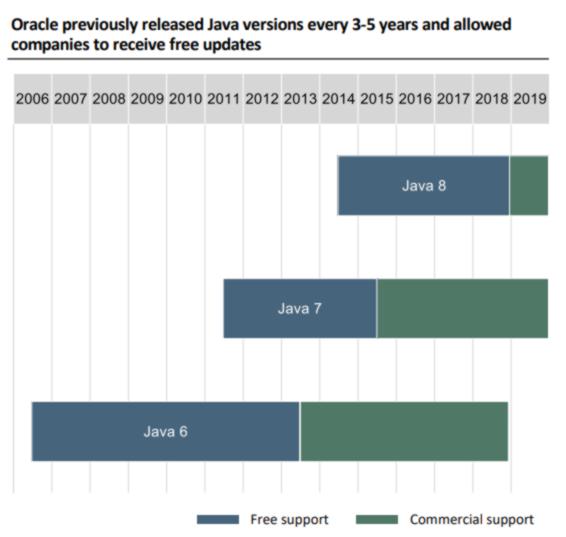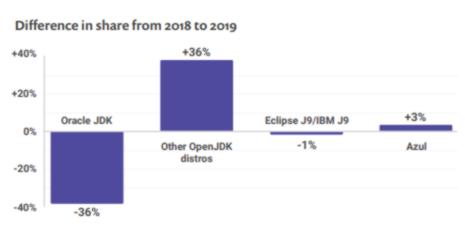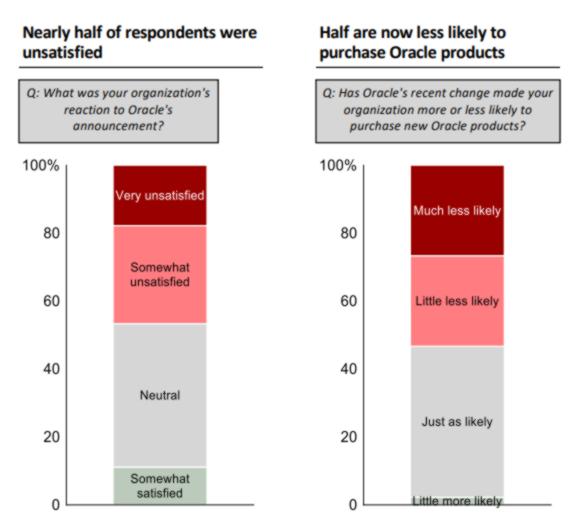| Enterprise Users Moving To Open JDK |
| Written by Janet Swift | |||
| Wednesday, 27 May 2020 | |||
|
Changes to the Java Release Cycle coupled with Oracle's changes to its licensing model, so that only those with a paid commercial subscription plan receive updates to Java, have provided a market opportunity for Open JDK support vendors, including Azul Systems. Until 2019, Oracle released new versions of Java every 3-5 years and provided all users with free updates (code patches) for at least 3 years. While Oracle sold licenses to organizations that required added support and tools, most companies did not have commercial support. Now Oracle has adopted a twice-yearly release cycle and we are already at Java 14, see JDK 14 Released and Oracle's new licensing terms, which came into effect with Java 12 released in April 2019, mean that there are only security patches. For most enterprise users updating every six months would be too disruptive. As a result there has been a switch away from Oracle to the Open JDK. As reported in Java 8 Remains Dominant, based on the 2020 JVM Ecosystem Survey Report from Snyk, whereas in 2018 Oracle JDK accounted for 70% and OpenJDK for 21% of the preferred JDK distribution, Oracle's proprietary share has shrunk to 34% while that of Open JDK has grown to over 60%. This chart from the Snyk report shows the swing from the Oracle JDK to alternate OpenJDK providers: Notice the 3% swing to Azul recorded in this chart, however research commissioned by Azul to look at the potential for it to increase its market share reveals that it could expect a much larger share. The survey was of 432 senior Java decision makers across a wide range of industries who are now facing up to the new situation in which JDK support costs are likely to skyrocket. On the basis of these findings the report (pdf) states: Fully 80% of Oracle JDK users are now in the process of considering other options. which I have to say would not be my interpretation. Azul does have products to offer enterprise users. Having started out as a hardware appliance company with JCAs (Java Computer Appliances) designed to massively scale up the usable computing resources available to Java applications, it transitioned to producing software-only solutions in 2019 with the introduction of its Zing JVM and runtime. This is described as: the only JVM with pauseless garbage collection technology, ensuring fast startup and consistent high performance without GC pauses, jitter, or application timeouts. Optimized for Linux and x86 platforms, running on-premises or in the cloud, Zing is designed for enterprise applications and production workloads ranging from web-facing apps and human-facing response times to latency-sensitive trading and payments platforms. Zulu, launched in 2013, is a certified binary build of OpenJDK and has three versions:
If Azul brand sounds familiar it could be because it is the default Java runtime used by Microsoft for the Java Ruintime Extensions to SQL Server that we reported on earlier this week. As stated then: There are, however, good reason to opt for the Zulu Java runtime. In order to work around Oracle's licensing traps regarding Java, Microsoft partnered with Azul to provide the Enterprise distribution of Java for free and, most importantly, with support provided by both Microsoft and Azul. More InformationRelated ArticlesRed Hat Takes Over OpenJDK Maintenance The True State of Java and its Ecosystem JVM Ecosystem Report Reveals the State of Java Microsoft Will Contribute To OpenJDK Java Language Extensions for SQL Server Open Sourced To be informed about new articles on I Programmer, sign up for our weekly newsletter, subscribe to the RSS feed and follow us on Twitter, Facebook or Linkedin.
Comments
or email your comment to: comments@i-programmer.info
|
|||
| Last Updated ( Wednesday, 27 May 2020 ) |






